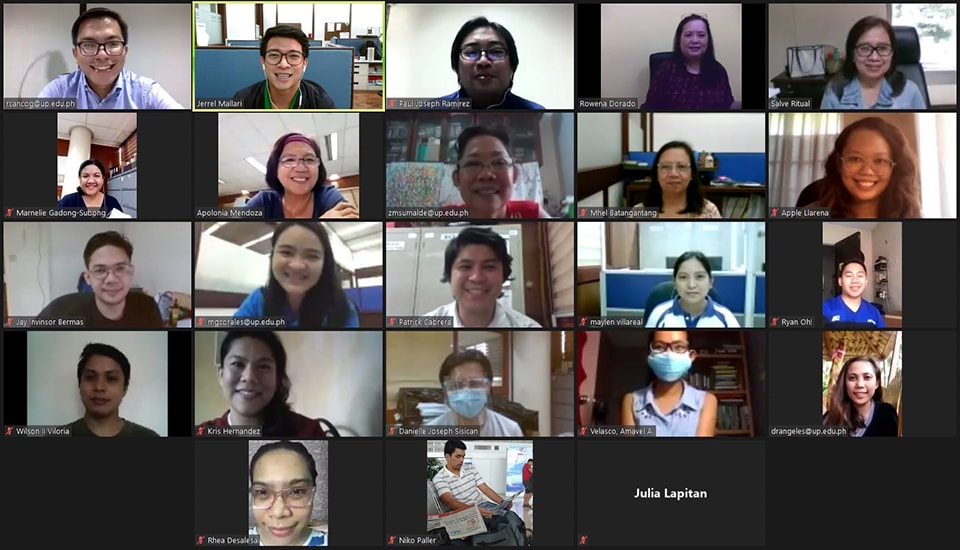
LOS BAÑOS, Philippines – The Southeast Asian Regional Center for Graduate Study and Research in Agriculture (SEARCA), through its Emerging Innovation for Growth Department (EIGD), conducted a virtual presentation on 20 August 2020 via Zoom platform to discuss its major recommendations on how the Community-based Participatory Action Research (CPAR) Program of the Department of Agriculture (DA) could be strengthened. The event participants were the DA-Bureau of Agricultural Research (BAR) Executive Committee members as well as staff from the Program Monitoring and Evaluation Division (PMED), Program Development Division (PDD) and Applied Communication Department (ACD).
The Community-based Participatory Action Research Program (CPAR) is one of the banner programs of DA-BAR. CPAR is a location-specific research cum extension activity that involves the verification and adaptation or demonstration of improved farming systems technologies and practices to suit the needs and requirements of a specific micro-agro-climatic environment within a given municipality or province. However, recent evaluation of projects suggests that there are still some misconceptions about the concepts of the program. DA-BAR sees the need to update and clarify the program log frame and expected outputs. The knowledge and understanding of the project implementers about CPAR are one of the key drivers of success of a project. Therefore, it is necessary to assess the program, especially from the point of view of the proponents and implementers, to identify key lessons and challenges in preparing proposals as well as in the actual implementation of the project in the field.
DA-BAR thus commissioned SEARCA to conduct the project titled "Building up from the Gains: Lessons from and Improvement for Effective Implementation of the CPAR Program" to assess the overall program cycle of implementation of CPAR. This project was implemented by SEARCA's EIGD headed by Dr. Rico C. Ancog together with Ms. Imelda L. Batangantang and Ms. Ma. Christina G. Corales, both Program Specialists.
Specifically, the project aimed to: 1) develop the Results-Based Monitoring and Evaluation (RBME) Framework for CPAR, 2) disseminate knowledge and information generated in the implementation of CPAR through the CPAR Congress, 3) develop a Policy Brief presenting the policy recommendations for the improvement of CPAR, and 4) update the CPAR Operations Manual using the lessons learned gathered from the implementing partners.
The SEARCA project team was composed of a project leader with two project consultants. It was led by Dr. Zenaida M. Sumalde together with Mr. Paul Joseph B. Ramirez and Ms. Rowena A. Dorado.
The project team presented the initial outputs of the study that assessed the overall program cycle of the CPAR Program, including the policy recommendations for the improvement of the CPAR Program, updated CPAR Operations Manual, and the Results-Based Monitoring and Evaluation (RBME) framework crafted by the team. Information presented during the forum were from the data gathered during the key informant interviews and focus group discussions conducted by the project team, as well as from consultations with DA-BAR staff. The presentation of these results was needed to revalidate and affirm the recommendations formulated by the team.
Engaging discussions transpired between the presenter and the participants. Mr. Joell H. Lales, Division Head, PDD, commended the group's efforts in formulating the project outputs. He saw the need to improve the CPAR Program's implementation, especially as it is considered as a springboard for the out-scaling program of DA-BAR's research initiatives. Ms. Salvacion M. Ritual, Division Head of DA-BAR PMED, congratulated and thanked the team for providing DA-BAR with a working framework that can be adopted by the rest of the Bureau's programs. They are looking at the CPAR Program as the miniscule model of the refocus program of the DA-BAR which was entitled "Resiliency Response Research for Development."
Insights and suggestions were captured by the team to further improve the project output. The same presentation will be given to different regional research representatives, CPAR Focal, implementer, and proponents on 26 August 2020.
Ms. Darlyn R. Angeles, Project Associate; Mr. Jerrel Edric B. Mallari, Project Assistant; and Ms. Annielyn P. Lapiz, Program Support Staff, provided logistical support during the virtual meeting.